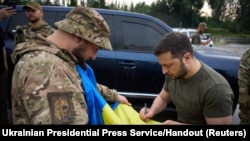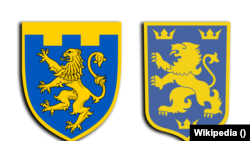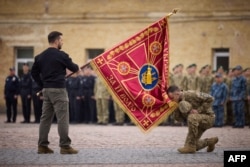On X, formerly Twitter, Russia-employed and pro-Russian users are continuing the disinformation campaign to justify Russia’s war in Ukraine by exploiting a Nazi incident in the Canadian parliament.
Yaroslav Hunka, a 98-year-old Canadian emigre of Ukrainian origin who served in the 14th Waffen Grenadier Division of the SS, the military wing of the Nazi Party, was honored as "hero" who had fought for Ukrainian independence at a session of the Canadian House of Commons featuring an address by visiting Ukrainian President Volodymyr Zelenskyy on September 22.
The 14th Waffen Grenadier Division was largely made up of Ukrainian volunteers.
House of Commons Speaker Anthony Rota was subsequently forced to resign as speaker and Canadian Prime Minister Justin Trudeau apologized for the “deeply embarrassing” incident.
Russia, however, seized the opportunity to amplify the Kremlin’s false justification of its military aggression in Ukraine.
Afshin Rattansi, the presenter of “Going Underground" on Russian state broadcaster RT, quote-tweeted a post that repeated the Kremlin propaganda line: “The West will fight to the last Ukrainian in its proxy war against Russia.”
Rattansi’s tweet included a video of Zelenskyy visiting members of the 103rd Territorial Defense Brigade in the Kharkiv region.
In his comment, Rattansi raised the Hunka incident to smear President Zelenskyy.
He said:
“A week after Zelensky/Nazi SS Hunka given ovation by Trudeau & the entire Canadian parliament, Zelensky in Ukraine is presented with the emblem of the 14th SS Grenadier Division to which Hunka belonged, that massacred thousands of Jews, Poles and dissidents during the holocaust.”
Zelenskyy was presented with a flag, but it was for Ukraine’s 103rd Territorial Defense Brigade, not the 14th Waffen Grenadier Division of the SS.
Hours after his initial tweet, Rattansi acknowledged this, and tweeted a link to the Wikipedia page for the 103rd Territorial Defense Brigade, writing: “Similarities are uncanny.”
That’s because both emblems include a variation of the Ruthenian lion, which appears as a golden lion on an azure background.
The Ruthenian lion is depicted on the coat of arms of the city of Lviv, and the region of Lviv.
The 103rd Territorial Defense Brigade was formed in Lviv region in 2018. The Ruthenian lion has deep roots in Ukrainian history, and was first used in the 14th century.
It appeared on the coat of arms of the Galicia-Volhynia state, the direct successor of Kyivan Rus, a medieval state centered around what is today modern-day Kyiv.
From the 12th century, Western European powers used the term Ruthenia to refer to Kyivan Rus, whose territory covered modern-day Ukraine, Belarus and Russia.
Yuri I of Galicia, the King of Ruthenia from 1301–1308, used the Ruthenian lion on his seal. It was also minted on Ruthenian coins.
The Ruthenian Voivodeship, an administrative-territorial unit of the Crown of the Kingdom of Poland, also used the Ruthenian lion on its coast of arms. The Ruthenian Voivodeship had a center in Lviv, and it existed from 1434 to 1772.
During the revolutions of 1848 in the Austrian Empire, the Supreme Ruthenian Council, the first legal Ukrainian political organization in the modern era, adopted the Ruthenian lion as their coat of arms at a meeting in Lviv. At that time, Lviv was part of the Austrian Empire.
The West Ukrainian National Republic, a short-lived breakaway state that formed after the collapse of the Austro-Hungarian empire, also used the Ruthenian lion in its coat of arms.
Since Russia first invaded Ukraine in 2014, some Ukrainians have increasingly glorified controversial figures opposed to Soviet rule, including some who collaborated with Nazi Germany, viewing them as national liberation figures.
This phenomenon exists in other Eastern European states formerly occupied by the Soviet Union.
Zelenskyy does not support it. Born to a Russian-speaking Jewish family, he is not a Nazi, and his family directly suffered from Nazi extermination policies. Zelenskyy’s great-grandfather and three great-uncles were killed in the Nazi Holocaust during WWII.
Still, other verified X users spread similarly false claims intended to link Zelenskyy and modern-day Ukraine to Nazism.
When small groups of Ukrainians attended marches in Ukraine celebrating the 78th anniversary of the establishment of the 14th Waffen Grenadier Division of the SS on April 28, 2021, Zelenskyy condemned them, calling the march illegal.
“We categorically condemn any manifestation of propaganda of totalitarian regimes, in particular the National Socialist, and attempts to revise truth about World War II,” Zelenskyy said at the time.
One march participant who used a Nazi salute was charged with Nazi propaganda and petty hooliganism.
Like Russia and Europe, far-right extremists groups exist in Ukraine, although in Ukraine they have no real political power.
As Polygraph.info has previously noted, the union of all Ukraine’s far-right political organizations for the 2019 parliamentary elections won only 2.15% of the vote – not enough to gain a single seat.
Ukraine’s ruling Servant of the People party, founded by Zelenskyy, is centrist, liberal and pro-European.
For a brief window after Zelenskyy’s election, Ukraine was the only country outside of Israel to have a president and prime minister (Volodymyr Groysman) who were Jewish.
Russian President Vladimir Putin, who has falsely attempted to portray his invasion of Ukraine as an extension of World War II and a fight to “de-Nazify Ukraine,” has attempted to paper over that reality with rhetoric that critics called anti-Semitic.
Putin falsely claimed “Western curators” had installed “an ethnic Jew” as the head of modern-day Ukraine to cover up “the anti-human essence” serving as the foundation of the modern Ukrainian state.”
While Moscow claims to be protecting ethnic Russians in Ukraine, it is Russia that regularly engages in eliminationist rhetoric against Ukrainians.
Pundits on Russian state TV regularly call for the eradication of the Ukrainian people and the Ukrainian state.
That rhetoric has been matched Russia’s complete destruction of at least nine large and small cities in Ukraine, and the systematic targeting of civilians.
Pundits on Russian state media have also appeared to promote genocide, denying Ukraine’s right to exist and comparing Ukrainians to “worms” that need to be removed.








